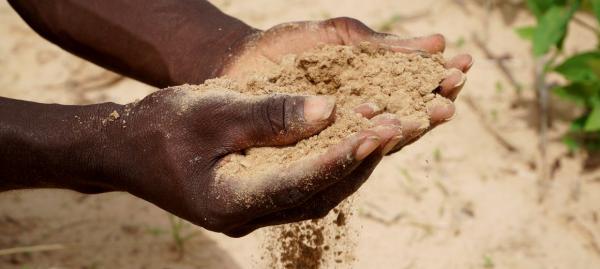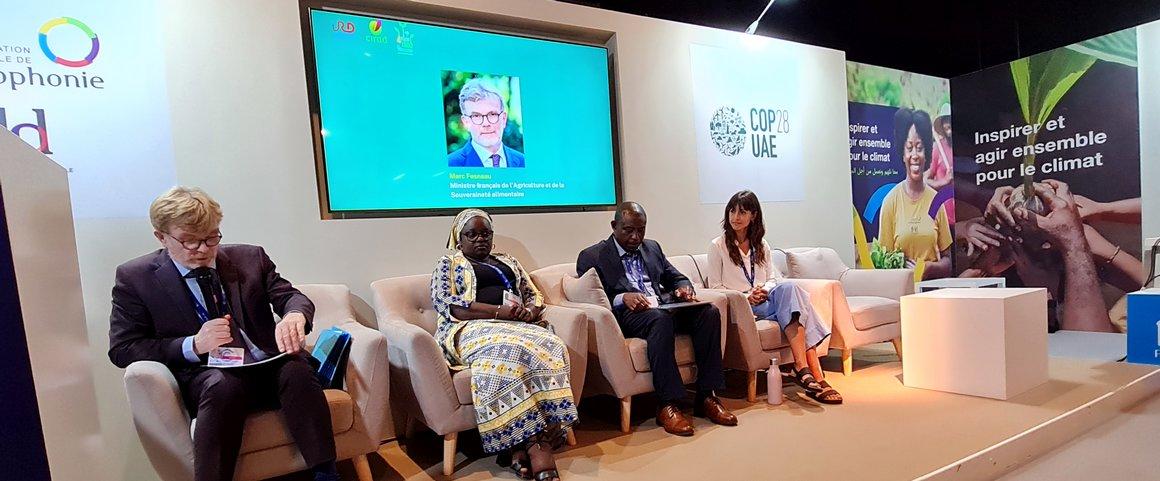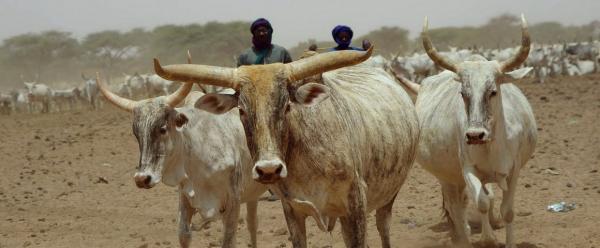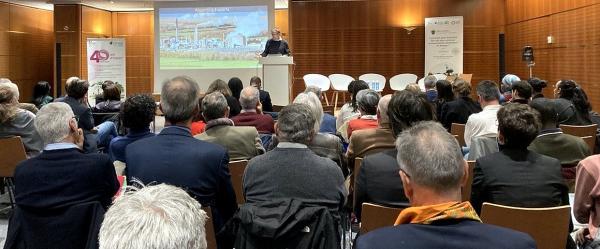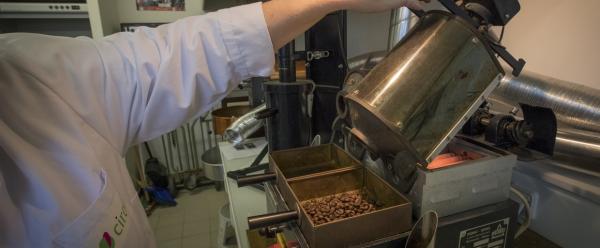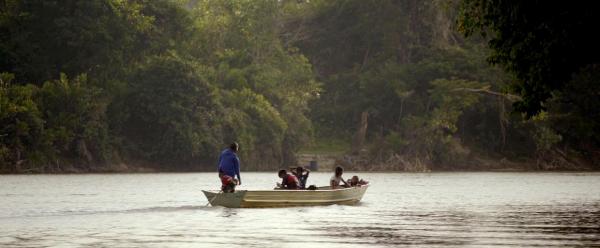The 28th COP (Conference of the Parties) ended in the early hours of 13 December. Two hundred countries reached agreement on a fossil fuel phase-out. This is a significant step forward in terms of the climate agenda, since it is vital to reduce fossil fuel use if we want to limit the rise in temperature worldwide. However, this unhoped-for agreement, signed in an oil-producing country, remains to be implemented through concrete measures such as matching funding.
"However, this is not the only thing worth noting about this conference", says Vincent Blanfort, Climate Change Officer at CIRAD. "Farming and food systems were covered in a declaration that sets them up as essential sectors in terms of climate change mitigation and adaptation. The latest IPCC report also highlights this, particularly since those sectors also bring into play issues such as food security, health, poverty alleviation and the rural economy, in the vast majority of countries worldwide."
Farming and food systems are making headway at the COPs…
The weight of farming and food systems in the current crisis and the vital issues surrounding their adaptation were overlooked for a long time in climate talks, but are increasingly part of the discussions. They were also the subject of a declaration made at the start of COP28, an initiative launched alongside the talks and planned well ahead of the event by the Emirati organizers. Some 138 countries have committed to include farming and food in their climate plans by 2025. As CIRAD's Marie Hrabanski, a sociologist specializing in climate policy, says, "the declaration is both important and commendable, as it will boost the role of farming and food systems in the contributions decided on a national level and in national adaptation plans. However, when it comes to actual work programmes, it's more difficult to really make progress."
While everyone is now in agreement about the need for transition in food and farming systems, the same cannot be said about the ways of going about it. "Some people think that priority should be given to technology-based approaches, without changing existing production systems. However, others feel that although technical innovations are required, they will not be enough, and holistic approaches should be promoted, in the hope of making food systems sustainable", the researcher adds.
… but have not yet passed the discussion stage
COP28 devoted 10 December to the topic of food, agriculture and water. The official declaration on "sustainable agriculture, resilient food systems, and climate action" was signed by 152 out of 197 countries. Vincent Blanfort, who was there, recalls that "there were more than 1000 people, which proves that these topics are a real part of the discussions. Several high-level panel meetings were held, often with ministers from a range of countries". He noted several particularly interesting facts:
- Of the 83 billion dollars of funding promised in all at this COP, 1.3 concern farming and food systems. That is significant, but still not enough (1.5%).
- Participants were reminded at a billion people will have trouble feeding themselves by 2030.
- A shared global vision of the transformation in food systems emerged, in the form of an immediate agenda. Regional versions of that agenda will have to be drafted at COP29, followed by national agendas at COP30. The agenda is to receive financial support from IFAD, the World Bank and FAO, to enable a series of concrete actions: 120 in all, which notably concern losses and waste, livestock farming, carbon capture and ecosystem restoration. Those actions are due to be integrated into the Contributions determined on a national level and national climate plans.
- The Secretary of State for Innovation and Sustainable Development at the Brazilian Ministry of Agriculture, Livestock and Food Supply concluded the declaration on sustainable agriculture, resilient food systems, and climate action. For Vincent Blanfort, "this is a major diplomatic signal, showing the importance given to the upcoming COP30 in Brazil". In particular, the Secretary of State symbolically stressed that in the current context, there are vital choices to be made: war or peace, and sustainable food supplies or hunger. She expressed a wish for a framework for international cooperation on food systems.
10 December was also the day that FAO chose to present its roadmap for agriculture in the future, which will have to reconcile food security and the fight against climate change. "The measures FAO prioritizes include increasing public subsidies to give people everywhere access to a healthy diet, reducing consumption in rich countries or develop agroecology tools", Marie Hrabanski explains. "The UN is calling on each country to draft national action plans within the coming two years, for six main fields." The stage is set for COP30, to be presided by Brazil.
Vincent Blanfort reminds us that "decisions concerning the food and agricultural sectors are complex, because they relate to several fields and do not concern a body under the United Nations Framework Convention on Climate Change (UNFCCC)".
Last year at COP27, the participating countries decided on a new work programme to implement climate action on agriculture and food security (taking over from the Koronivia joint work on agriculture). "This group laid the foundations for the official declaration issued on 10 December. However, there are still many sticking points in terms of the contents and shape of this work that were not resolved at COP28. The G77 (which comprises 134 developing and emerging countries) would like to set up an expert panel within this working group, to facilitate interactions with other COP bodies and thus make it easier to identify the priority topics and actions on the agenda for transforming food and farming systems."
Focus on four flagship topics for CIRAD at this COP
Health, for the first time at a Climate COP
This is the first time the topic of health has been covered at a Climate COP. For CIRAD's Thierry Lefrançois, a specialist in One Health questions, "health, climate and biodiversity are intrinsically linked and must be addressed simultaneously, by means of a One Health approach". He was in Dubai to organize a side event as part of the PREZODE initiative, in the France Pavilion. The event gave rise to a declaration calling on people to work together to build resilient One Health ecosystems, a declaration that was signed by Agnès Firmin Le Bodo, French Minister of Territorial Organization and Health Professions, by several other ministers and by PREZODE partner organizations.
Watch the replay (starting from 4:38)
Tropical forest preservation
9 December was devoted to "Nature, Land Use, and Oceans". The "Science Panel for the Amazon" chose the day to present its policy briefs for decision-makers. One of them was co-written by Plinio Sist, Heads of CIRAD's Forests and Societies research unit. It makes seven recommendations for sustainable forest management, combining timber production and landscape restoration.
France presented two initiatives to help countries protect their carbon and biodiversity stocks (see video below). "CIRAD contributed, notably by pinpointing research requirements", says Alain Billand, CIRAD's Director of Research Impact and Marketing, who was also at COP28. He was also invited by the Republic of the Congo to speak at the launch of the World Decade of Afforestation and Reforestation.
Soil health and carbon storage
CIRAD co-organized several side events on these topics, in association with IRD, the 4 per 1000 Initiative and other partners, in the France Pavilion, the UNFCCC Pavilion and the Francophonie Pavilion. At this last event, we had the honour of welcoming French Minister of Agriculture Marc Fesneau, on a panel alongside the CGIAR Director for Environment and Biodiversity, the Vice-President of the 4 per 1000 Initiative and the Institut sénégalais de recherche agricole.
Watch the replay
A specific spotlight was shone on the French overseas regions with a look at the topic of soil carbon in the form of a stocktake of knowledge and levers for action in the French overseas territories and for regional cooperation.
Experts from CIRAD, IRD and the "4 per 1000" international initiative have issued a reminder of the vital importance of healthy soils in ensuring that food systems meet the target of zero net CO2 emissions. A few days ahead of COP28, they make a series of recommendations in a policy brief intended for policymakers.
The carbon balance of agropastoral livestock systems
The CaSSECS project team was at COP28 to shine the spotlight on pastoral livestock systems in the Sahel. "Although these systems are a poor relation in terms of public policy, they provide a living for more than twenty million people in the Sahel and supply 70% of the milk consumed locally, along with half the beef and small ruminant meat", says CIRAD's Paulo Salgado, the project's scientific leader. '"The aim is also to restore the image of pastoral livestock systems in the Sahel within the negotiating arena", El Hadji Traoré, project coordinator and scientific director at the Institut sénégalais de recherche agricole, explains. For CIRAD's Habibou Assouma, a specialist in carbon balance questions, "the CaSSECS project's participation in COP28 fits into a drive to raise public awareness of the issues surrounding the carbon impact of agropastoral systems". To this end, the project has published a policy brief intended for a broad readership.
Livestock farming is reported to be responsible for 12% of greenhouse gas emissions worldwide*. However, those calculations are based on intensive livestock systems that see animals as having just one function: meat or milk production. In the Sahel, animals provide a range of services: they boost food security, are a means of transport, a form of savings, fertilize soils, spread seeds, and so on. On an ecosystem scale, pastoral activities have a neutral carbon balance, and can even store carbon in some cases.
* Group of Research and Independent NGOs – RINGO.
